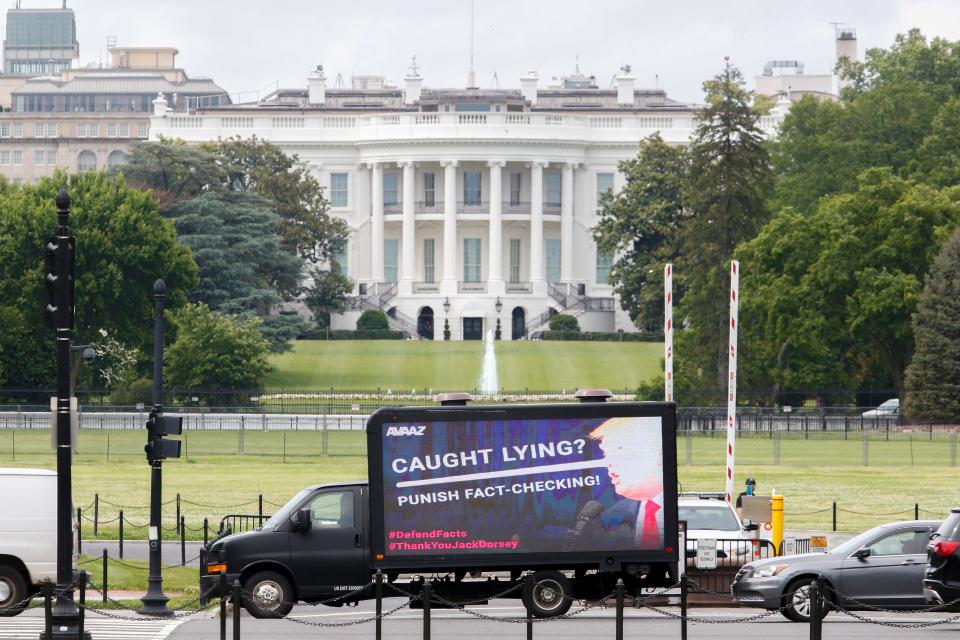Fact-checking Trump: He's on a dangerous path that must be documented and discouraged
When Donald Trump in 2015 announced he was running for president, I started our fact check of his error-filled announcement speech with these words: “Businessman Donald Trump is a fact checker’s dream … and nightmare.”
That may sound prophetic — and I certainly had experience covering Trump’s mendacity when I was a business reporter in the 1990s — but even I was unprepared for the tsunami of untruths we encountered over the course of the campaign. At The Washington Post’s Fact Checker, we rate political claims on a Pinocchio scale. Our worst rating is four Pinocchios, meaning “a whopper.” Most politicians earn four Pinocchios about 15% to 20% of the time. But nearly two-thirds of Trump’s statements during the 2016 race received Four-Pinocchio ratings.
Unfortunately, as president, Trump’s track record has only gotten worse. From the start of Trump’s presidency, The Washington Post Fact Checker team has catalogued every false or misleading statement he has made. As of Friday, 1,226 days into his presidency, the count stood at 19,127 claims.
That works out to more than 15 claims per day. But the pace of deception has quickened dramatically. He averaged six claims a day in 2017, nearly 16 a day in 2018 and more than 22 in 2019. Indeed, the president made more false or misleading claims in 2019 than he did in 2017 and 2018 combined.
Tweet, tweet: Trump executive order retaliates against Twitter, but no one is defending free speech
Every president lies at some point, for diplomatic or national security reasons or to sell a policy. But Trump is not known for one big lie — just a constant stream of exaggerated, invented, inconsistent, dubious and false claims. In the nine years I have run The Fact Checker, I have never encountered a politician so cavalier about the facts, so unconcerned with accuracy, so willing to attack people for made-up reasons and so determined to falsely depict his achievements.
We started our database of Trump claims out of a desire to not let Trump overwhelm our fact-checking enterprise. We aim to fact-check politicians of every stripe, not just whoever happens to be president. We use politicians’ claims as a jumping off point to write deeply about complex policy issues, so we did not want that core function to be sidelined by chasing down the latest bizarre tweet by the president. But once Trump effectively became his own press secretary in mid-2018, our weekends and evenings were soon lost to the depressing task of wading through the president’s forest of falsehoods.

But ultimately, it has been a personally fulfilling enterprise. Our cataloging of Trump’s claims has had an impact. Social scientists have already mined our database for research into Trump’s patterns of lying. Historians will find the database useful when they try to make sense of this unique era in American politics.
There is evidence that Trump’s falsehoods have hurt him more than they have helped him. The Fact Checker team in late 2018 worked with The Washington Post’s pollster to discover whether people increasingly believed 11 of Trump’s most repeated false statements. The poll found that fewer than 3 in 10 Americans — including fewer than 4 in 10 Republicans — believed these claims.
Moreover, Trump consistently has failed to win majority support of Americans in public opinion polls, with his rating dragged down by skepticism about his honesty. The Gallup poll in 2019 found that only 34% surveyed believe Trump is honest and trustworthy, compared with 65% for George W. Bush and 61% for Barack Obama.
Trump, Twitter and the truth: The internet’s septic problem
Still, Trump retains a strong base of support by exploiting a growing divide between blue and red America.
In the United States, party identification increasingly is seen as an essential sign of character. In 1960, a survey found that only 4% of Democrats and 5% of Republicans said they would be disappointed if their child married someone from the opposite political party. In a 2019 survey, 45% of Democrats and 35% of Republicans said they would be somewhat or very unhappy if their son or daughter married someone from the other party.
That makes my job as a fact-checker even harder, as partisans increasingly react with fury depending on whose ox is being gored. Democrats get especially upset, apparently because of the belief that any possible transgression by a Democrat is not worth fact-checking when the president is constantly trying to mislead Americans. But all politicians should be held to a high standard. If they need to spin the facts in order to promote a policy, then maybe there is something wrong with the policy.
Trump exemplifies the social media creature who exists in a partisan world of his own, refusing to let conflicting facts get in his way. But that’s a dangerous path and certainly not model behavior. By diversifying your social media and news diet, you can learn from people who challenge your assumptions. Be open to new ideas and don’t jump to conclusions. Remember: Every politician is trying to sell you something — so, buyer beware.
Glenn Kessler, editor and chief writer of The Washington Post Fact Checker, is co-author of “Donald Trump and His Assault on Truth: The President's Falsehoods, Misleading Claims and Flat-Out Lies,” published Tuesday. Follow him on Twitter: @GlennKesslerWP
You can read diverse opinions from our Board of Contributors and other writers on the Opinion front page, on Twitter @usatodayopinion and in our daily Opinion newsletter. To respond to a column, submit a comment to letters@usatoday.com.
This article originally appeared on USA TODAY: Fact-checking Donald Trump is essential for historians and US politics

